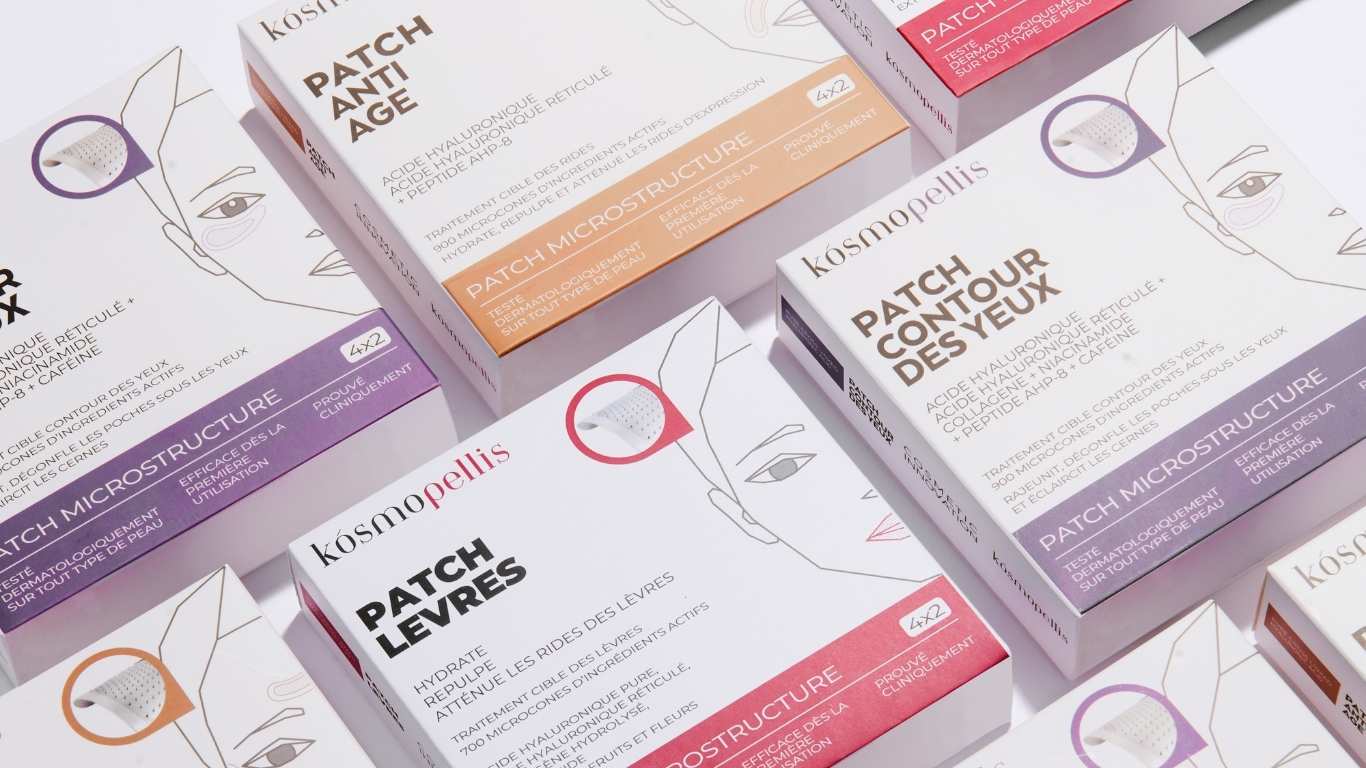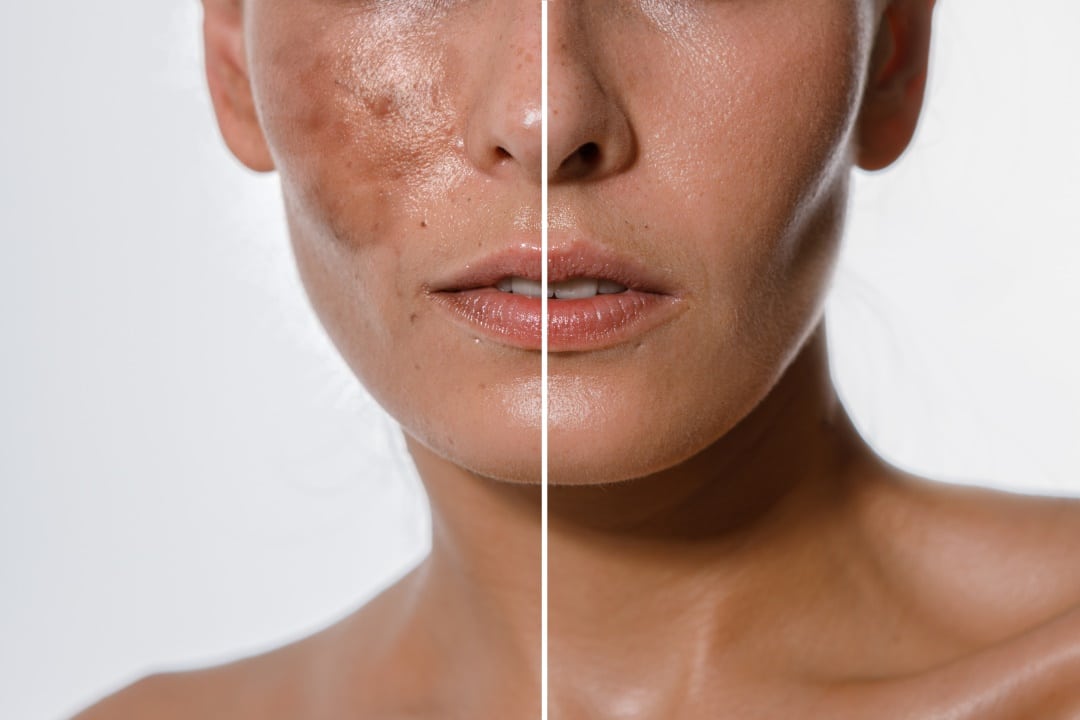
Pregnancy Mask: How to Avoid Blemishes During Pregnancy
Introduction
Pregnancy mask , also known as melasma or chloasma, is a hyperpigmentation of the face in pregnant women. This condition causes dark patches to appear on areas such as the upper lip, nose, cheekbones, cheeks, and forehead. Hyperpigmentation during pregnancy affects about 46.5% of pregnant women and usually appears between the fourth and ninth month.
Addressing skin blemishes in pregnant women is essential for several reasons:
- Emotional well-being : Physical changes can affect self-esteem and overall well-being.
- Prevention : Knowing the causes and prevention methods helps minimize the impact of pregnancy mask.
- Effective solutions : Providing information about available treatments allows women to make informed decisions about their skin care.
Taking a proactive approach to these skin changes can make a significant difference during this unique time.
Understanding the pregnancy mask
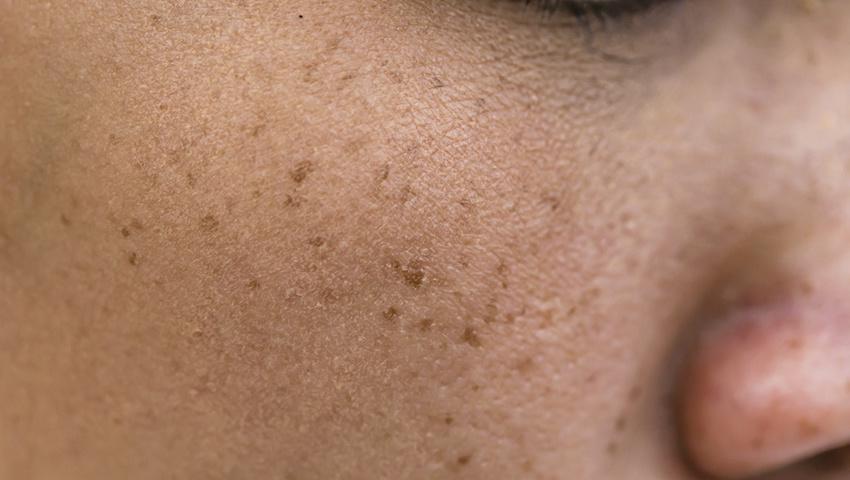
Pregnancy mask , also known as melasma and chloasma , is a form of hyperpigmentation that commonly occurs in pregnant women. This phenomenon manifests itself by the appearance of dark patches on various parts of the face, including the upper lip, nose, cheekbones, cheeks, and forehead.
Melasma and chloasma are the two terms often used to describe this skin condition:
- Melasma : This term generally refers to hyperpigmentation that can occur at any time, not just during pregnancy. It often results from hormonal imbalance and is frequently exacerbated by sun exposure.
- Chloasma : More specifically associated with pregnancy, chloasma appears in response to the hormonal changes the body undergoes during this time.
Symptoms associated with pregnancy mask include:
- Appearance of brown or grayish spots on the face
- Symmetrical pigmentation of sun-exposed areas
- Accentuation of spots with UV exposure
Studies show that this phenomenon affects approximately 46.5% of pregnant women, especially those with darker skin. Understanding the causes and symptoms of pregnancy mask allows us to better understand effective methods to prevent and treat this hyperpigmentation.
Underlying Causes of Pregnancy Mask
Pregnancy mask is mainly caused by hormonal changes and sun exposure. Hormones play a crucial role in this phenomenon.
- Progesterone and Estrogen : During pregnancy, progesterone and estrogen levels increase significantly. These hormones stimulate pigment-producing cells called melanocytes, leading to excessive production of melanin. This overproduction leads to the appearance of brown spots characteristic of melasma and chloasma.
- Sun exposure : UV light is a major aggravating factor. It intensifies the production of melanin, thus accentuating the pregnancy mask. It is therefore essential for pregnant women to limit their exposure to the sun and use adequate sun protection.
These two factors combined explain why pregnancy mask is so common and why it is important to adopt preventive measures to protect the skin during this particular period.
Preventing skin blemishes during pregnancy
The importance of adequate sun protection during pregnancy cannot be underestimated. To prevent the development of pregnancy mask, it is crucial to minimize exposure to UV rays. Pregnant women should incorporate sunscreen into their daily routine, even in winter or on cloudy days.
- Pregnancy sun protection : choose a sunscreen with a high protection factor (SPF 30-50) specifically formulated for the sensitive skin of pregnant women.
- Regular application : Apply sunscreen generously about 30 minutes before sun exposure and reapply every two hours or after swimming or sweating.
- Additional techniques : Wear covering clothing, wide hats and UV glasses to increase protection against the sun.
Consistent use of SPF 30-50 sunscreen helps reduce excessive stimulation of melanin caused by UV rays, thus reducing the risk of pregnancy mask appearing.
1. Choose effective sun protection
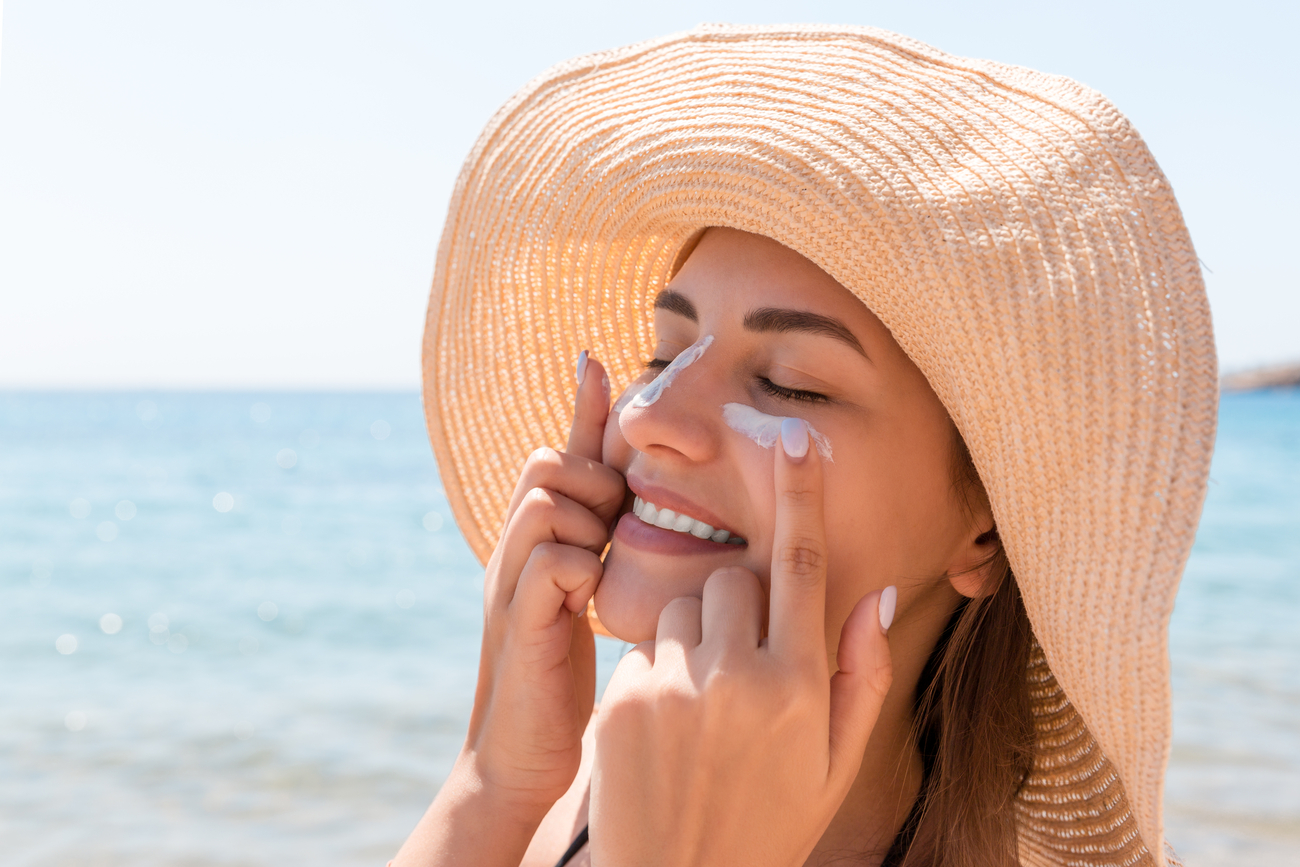 Choosing a sunscreen suitable for pregnant women is crucial to prevent the development of pregnancy mask. A sunscreen with a high protection factor ( SPF 30-50 ) is recommended. Here are some criteria to consider:
Choosing a sunscreen suitable for pregnant women is crucial to prevent the development of pregnancy mask. A sunscreen with a high protection factor ( SPF 30-50 ) is recommended. Here are some criteria to consider:
- UVB and UVA protection : A good sunscreen should protect against both types of ultraviolet rays.
- Non-comedogenic formula : This prevents clogging of pores and helps prevent acne.
- Safe ingredients : Choose formulas without oxybenzone and parabens, which are often not recommended during pregnancy.
- Suitable texture : Light, non-greasy sunscreens are more comfortable, especially in summer.
Regular application of sunscreen, every two hours, is essential when you are exposed to the sun. This precaution significantly reduces the risk of hyperpigmentation.
2. Adopt complementary measures
To enhance sun protection during pregnancy, it is crucial to adopt complementary measures. These strategies provide an additional barrier against UV rays, thus reducing the risk of developing pregnancy mask.
- Cover-up clothing : Wearing long, lightweight clothing can minimize direct sun exposure. Opt for breathable, UV-protective fabrics that are specifically designed for pregnant women.
- Wide-brimmed hats : A wide-brimmed hat not only protects the face but also the neck and shoulders.
- UV glasses : Sunglasses with category 3 or 4 UV protection provide effective protection for the eyes and the delicate skin around the eyes.
These measures, combined with suitable sunscreen, create a robust defense against the harmful effects of the sun.
3. Avoid harsh skin products
During pregnancy, skin often becomes more sensitive and reactive. It is essential to avoid mechanical scrubs and chemical peels for several reasons:
- Increased irritation : Mechanical scrubs can cause micro-tears in already fragile skin, leading to redness and inflammation.
- Risk of complications : Some chemical peels contain ingredients that are potentially harmful to the fetus or can cause severe skin reactions.
- Skin barrier damage : Excessive use of these products can weaken your skin's natural protective barrier, making it more vulnerable to external aggressions.
Choose gentle, moisturizing treatments that respect your skin's natural balance during this delicate period.
4. Opt for gentle skin care alternatives during pregnancy
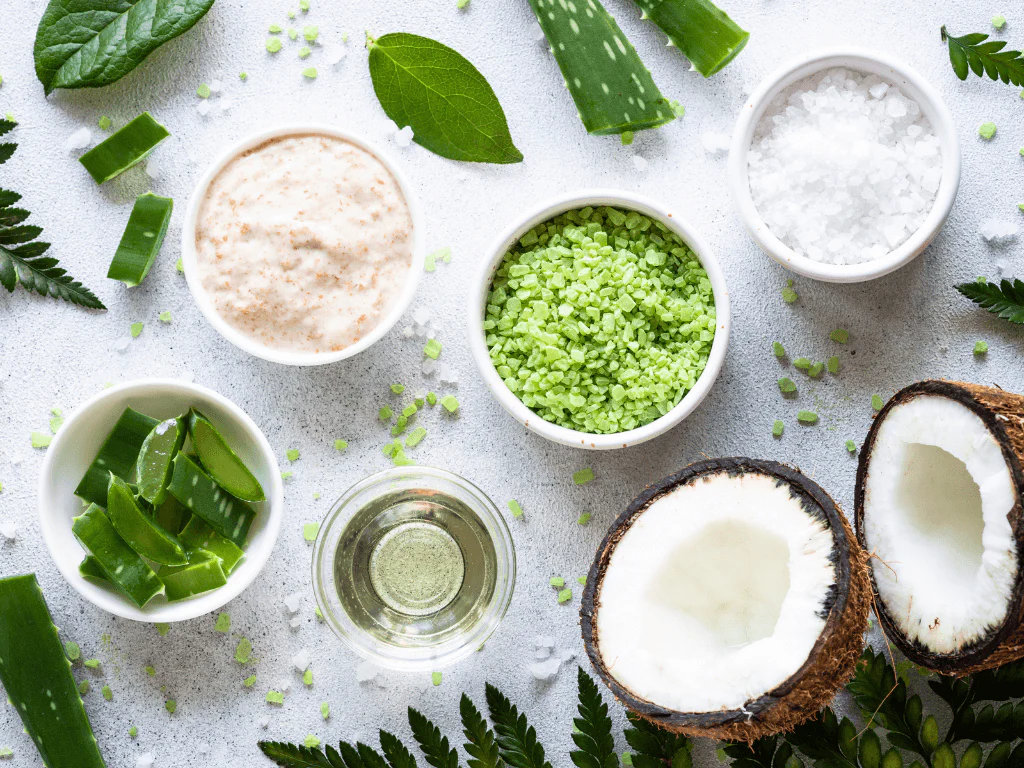
It is crucial to favor natural treatments for pregnancy mask in order to preserve the health of your skin and that of your baby. Here are some effective natural remedies:
- Organic Aloe Vera Gel : Apply a thin layer of aloe vera gel to dark spots for its soothing and moisturizing properties. Aloe vera helps reduce inflammation and promotes cell regeneration.
- Essential oils : Some essential oils, such as lemon essential oil, can be diluted in a night cream or serum. Using them regularly can reduce the appearance of dark spots due to their lightening properties.
- Turmeric and Whole Milk Paste : Mix turmeric powder with whole milk to form a paste. Apply daily to affected areas to benefit from the anti-inflammatory and skin lightening properties of turmeric.
These gentle alternatives allow you to take care of your skin without resorting to aggressive products, while limiting the risks to your health and that of your child.
5. Consult a specialist dermatologist if pregnancy mask persists or is uncomfortable.
Postpartum pregnancy mask: what to do?
Brown spots related to pregnancy mask can sometimes persist after childbirth. The spontaneous disappearance of these spots is common, but some women continue to suffer from them long after the birth of their child. In these cases, consulting a specialized dermatologist becomes crucial.
Evolution of brown spots after childbirth:
- Spontaneous disappearance : For many women, the spots begin to fade naturally a few months after giving birth.
- Persistence of spots : If spots persist beyond six months, this may indicate a need for dermatological intervention.
Available solutions:
1. Depigmenting creams :
- Prescribed by a dermatologist, they often contain active agents such as hydroquinone, tretinoin or azelaic acid.
- They help regulate melanin production and lighten existing spots.
2. Chemical peels :
- Use of chemical agents to exfoliate the skin and stimulate cell renewal.
- These treatments can be effective in reducing dark spots but must be carried out under medical supervision.
3. Laser therapy :
- Fractional laser or Q-Switched laser are often used to target and break down melanin in affected areas.
- This treatment is particularly useful for skin that does not respond to depigmenting creams.
4. Cryotherapy :
- Technique using liquid nitrogen to destroy pigment cells.
- May cause white scars if poorly performed; therefore requires dermatological expertise.
5. Personalized consultation :
- An accurate diagnosis by a dermatologist allows an appropriate treatment plan to be established.
- Services like Livi offer quick consultations and electronic prescriptions valid in pharmacies.
The role of a dermatologist in the management of postpartum pregnancy mask is essential to determine the best treatment and monitor its effectiveness. If you are unsure about your symptoms or if you experience significant discomfort, do not hesitate to consult a professional to obtain personalized medical advice from a dermatologist to establish an appropriate treatment plan.
The role of a dermatologist in the management of postpartum pregnancy mask is essential to determine the best treatment and monitor its effectiveness. If you are unsure about your symptoms or if you experience significant discomfort, do not hesitate to consult a professional to obtain personalized medical advice.
The psychological impact of the pregnancy mask: an often overlooked aspect
Skin blemishes, including the pregnancy mask, can have a significant impact on the mental state of pregnant women. The appearance of brown spots on the face can lead to a drop in self-esteem and social embarrassment. It is therefore essential to consider the psychological impact of these skin disorders and offer emotional support to women who suffer from them. Solutions such as cognitive behavioral therapy can be considered to help deal with these aesthetic problems and improve self-confidence. Let us not forget that beauty lies in diversity and that each mark on our skin tells a unique story.
Consult a dermatologist pregnancy mask :
- Importance of a consultation : If the mask persists or causes significant discomfort, it is crucial to consult a dermatologist. A professional can offer appropriate treatments and reassure the patient.
Psychological impact of skin imperfections :
- Emotional effects : Women may experience frustration, anxiety, and even depression due to changes in their appearance. Emotional support is essential to get through this difficult time.
- Family and social support : A strong support network can help mitigate negative psychological effects. Sharing concerns with loved ones or joining pregnancy support groups can be beneficial.
Postpartum pregnancy mask can also prolong these feelings of discomfort. While the spots may disappear after delivery, it is important to approach this topic with sensitivity and understanding to provide the best possible support to new mothers. Emotional support and proper treatment can help alleviate the effects of pregnancy mask. Pregnant women should be encouraged to consult a dermatologist for professional advice and treatment options tailored to their situation. Additionally, it is crucial that friends, family, and society at large are aware of the psychological impact of these skin imperfections and offer empathetic support to women who suffer from them.
Conclusion: taking care of yourself during pregnancy is essential!
Taking care of your skin during pregnancy is crucial, both physically and emotionally. In case of persistence or significant discomfort related to the postpartum pregnancy mask, To consult a dermatologist . is essential. A specialist can offer you suitable solutions to reduce brown spots and improve your well-being. You deserve to feel good about your skin during this special time. Prioritize gentle care and effective sun protection to prevent skin imperfections.
